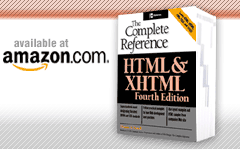home » about
INTRO
The fourth edition of this book represents a significant change in order to fully embrace XHTML. Although the previous edition presented XHTML, most of the examples were still in HTML 4 with explanations about differences with XHTML. Today the situation is reversed with the primary focus on the future of markup with XHTML, CSS and XML rather than the past, filled with tricks and messy table code.
Interestingly, while many books have embraced XHTML, relatively few Web page authors have. Futhermore, at the time of this edition's writing many Web tools do not produce correct markup in traditional HTML, let alone XHTML. Yet the times are changing. During 2002 and 2003 the survivors of the dot com boom have come to take their trade very seriously and more and more sites are truly embracing Web standards.
This book was updated assuming the "embrace the standards" trend will continue. HTML 4 is still well covered and the important table techniques are still presented, but compared to other books on HTML, heavy focus on what Netscape 2 did seven or more years ago is completely purged. Furthermore the focus is very much away from Netscape— especially given that it has been recently discontinued— and more on Internet Explorer, Mozilla, and Opera. Because of this focus on the future, the fourth edition should be both valuable to the standards-conscious designer looking for a reference as well as the newcomer hoping to learn what they need to know for today and tomorrow.
In closing, in my opinion any book that claims to be a "complete reference" has a pretty tough task to complete. But I do honestly believe that readers who study this book carefully will find that they have a complete understanding of HTML, XHTML, CSS, and related client-side technologies. However, if you master this one, remember as I rediscover every day— there is always more to know about Web development. So if you master markup, there are plenty of other books (written both by me and by others) on JavaScript, Web Design, usability, and so on to keep you busy, so get cracking!
Thomas Powell
tpowell@pint.com
July 2003


